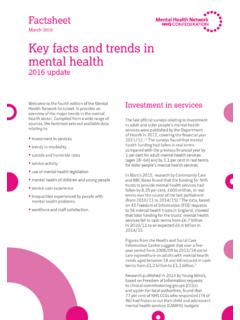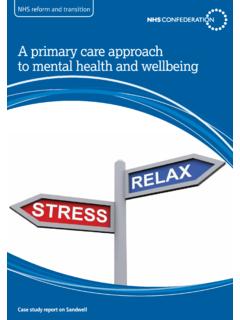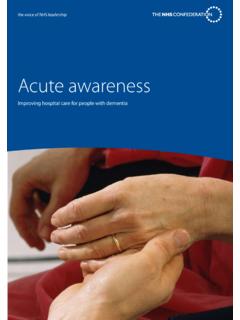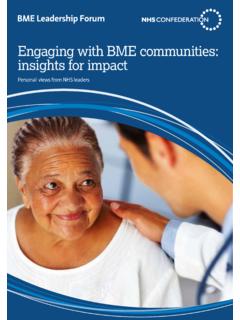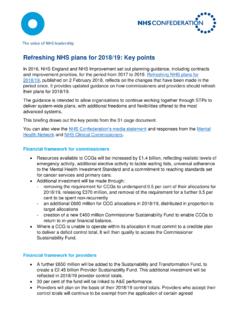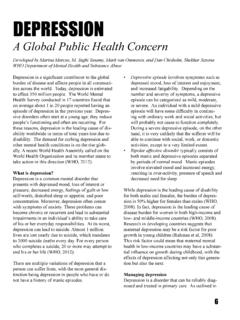Transcription of Defining mental health services - NHS Confederation
1 Defining mental health services Promoting effective commissioning and supporting QIPPE ndorsed by The NHS Confederation The NHS Confederation is the only body to bring together the full range of organisations that make up the modern NHS to help improve the health of patients and public. We are an independent membership organisation that represents all types of providers and commissioners of NHS speak for the whole of the NHS on the issues that matter to all those involved in healthcare. We also reflect the diverse views of the different parts of the healthcare focus on:influencing healthcare policy and providing a strong voice for healthcare leaders on the issues that matter to all those involved in healthcare helping our members to make sense of the whole health and social care system bringing people together from across health and social care to tackle the issues that matter most to our members, patients and the more information on our work, see: This publication has been manufactured using paper produced under the FSC Chain of Custody.
2 It is printed using vegetable-based inks and low VOC processes by a printer employing the ISO14001 environmental 2 Executive summary 3 Introduction 4 Background 5 Context 7 Methodology 8 Definitions 9 Acute inpatient bed 9 Psychiatric intensive care unit 10 Forensic services 11 Recovery and rehabilitation services 12 CAMHS Tier 4 inpatient services 14 Dementia assessment 15 Care homes and nursing home care 16 Housing and housing-related support 17 Crisis accommodation 18 Living at home with a care package 19 Recommendations for further action 20 Further reading and references 21 Acknowledgements 22 Defining mental health services02 ForewordHealth and social care commissioners and service providers are focusing on the importance of quality and productivity as ways of ensuring better outcomes, improved service models and effective this requires a clearer understanding of the types of services currently provided, an understanding that is shared across the system.
3 In mental health there has not been a consistent set of definitions that describes what is meant by an inpatient bed. This has led to difficulty in benchmarking and understanding patterns of report seeks to address those variations of understanding by suggesting a range of definitions that can be used by commissioners and service providers. The work to develop the definitions has benefited from the contributions of a range of experts in the field of mental would like to thank the following key stakeholders for supporting this report:The Association of Directors of Adult Social services (ADASS)The NHS Confederation The Royal College of GPs The Royal College of Nursing The Royal College of Psychiatrists. These definitions are being piloted with a view to future implementation.
4 We hope that in the meantime organisations will want to draw upon them, and that by Defining services in this way we can enable effective and consistent decision-making about service Symington, Chair of Task and Finish Group on mental health bed definitionsDefining mental health services03In mental health there has not been a consistent set of definitions that describe what is meant by an inpatient bed. This has led to difficulty in benchmarking and understanding patterns of how inpatient beds and community services can best be utilised as part of a reshaped pathway, and whether the number of beds can be further reduced over time, with an appropriate mix to meet local need, is a key component in a commissioner s knowledge and productivity improvements should not just be about reducing beds.
5 They should be about ensuring the right number and mix of beds in the right place with the right level of support, based on an agreed definition and common understanding of what each set of beds or services is greater consistency to both language and understanding in respect of Defining services will enable decision making about service redesign to be more consistent and based on a set of definitions that are well understood and accepted across the summaryDefining mental health services04In March 2011 the National mental health Development Unit (NMHDU), in collaboration with strategic health authority (SHA) mental health leads, commissioned a short, focused piece of work to develop a set of definitions for mental health inpatient services .
6 The work was supported by a small group of specialist clinical and data advisers and the discussion paper arising from the work was published at the end of March, just prior to NMHDU ceasing then, a number of people who were involved with that work have continued to discuss how best to take forward the definitions themselves, alongside whether to develop some additional areas of enquiry relating to beds that are provided outside traditional hospital settings, in order to support the mental health commissioning and the Quality, Innovation, Productivity and Prevention (QIPP) Department of health , in partnership with the mental health Network of the NHS Confederation and the Joint Commissioning Panel for mental health (JCPMH) and SHA mental health leads, commissioned a second phase of work that started in July previous paper has now been updated to include additional definitions to complete the pathway and includes some community-based services that are not funded directly by the NHS:24/7 residential and nursing home care supporting people services (housing and housing-related support)living at home with a care package crisis accommodation inpatient dementia assessment services .
7 The limitations of the current paper leave further potential to agree definitions for beds for older people with a functional mental illness, a range of specialist beds and other community services which make up mental healthcare pathways. The definitions set out in this paper have been endorsed both by the members of the original advisory group and a range of key stakeholder organisations. These include:The Audit Commission ADASS The Department of Heath The mental health Network of the NHS ConfederationThe NHS Information Centre The Royal College of GPs The Royal College of Nursing The Royal College of Psychiatrists SHA mental health leads. The overriding principle of this project is its recognition that productivity improvement and redesign processes should not just be about reducing the number of beds per se.
8 Rather, they should be about ensuring the right number and mix of beds in the right place with the right level of support, based on an agreed definition and common understanding of what each set of beds or services is for. It is hoped that attempting to bring some consistency to both language and understanding in respect of Defining services will enable decision-making about service redesign to be based on a set of broadly agreed, consistent definitions. Work has also been done to identify NHS organisations who can pilot the definitions over a three-month period. At the same time, discussions are being held between the Department of health and the NHS Information Centre about how to establish the ways in which key resources, applications and indicators should be adapted to take advantage of the new mental health services05 mental health services in England have developed substantially over the past decade.
9 The National Service Framework (NSF) for mental health was a key lever in delivering improvements. The associated policy implementation guide (PIG) set out a range of service models that commissioners and providers adopted as part of a process for developing new teams, mainly in community settings. The PIG set clear criteria and definitions for those services , describing their workforce composition, aims, objectives and targets for the number of interventions in any given locality. The definitions of the service models were deliberately prescriptive and based on the best international evidence at the time. The key aim was to provide home and community-based services as a safe, high-quality alternative to bed use. Although there was a degree of flexibility, there existed a broad consensus about the definition of each service, no matter where in England it was being NSF concentrated in the main on community-based services for people with severe and enduring mental ill health .
10 It included crisis resolution and home treatment, assertive outreach and early intervention teams. Although there was reference in the NSF to inpatient services and the publication of some guidance, there was less emphasis on the inpatient environment and on rehabilitation services in either the health or social care sectors. The consequence of this has been an underdeveloped understanding of what certain bed-based, often inpatient and accommodation services do, and whom they the publication of some guidance in the last few years, including the development of the Acute Care Declaration1, there was no clear or endorsed definition of inpatient beds across the different service sectors. For instance, the definition of an acute inpatient bed can differ from provider to provider.
